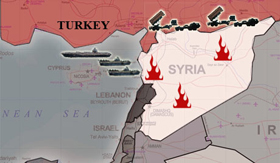Interview
The Syria situation seems quite unpredictable. Some countries seek to perform a military strike at the earliest opportunity, while certain global and regional powers doubt that an attack would help either the region or the global community as a whole. We have met RIAC Member Vitaly Naumkin, Director of the RAS Institute for Oriental Studies, to talk about the probability of a military strike and its likely consequences.
Interview
The Syria situation seems quite unpredictable. Some countries seek to perform a military strike at the earliest opportunity, while certain global and regional powers doubt that an attack would help either the region or the global community as a whole. We have met RIAC Member Vitaly Naumkin, Director of the RAS Institute for Oriental Studies, to talk about the probability of a military strike and its likely consequences.
The media is increasingly anxious that a military attack on Syria may be the harbinger of a big Middle Eastern war. How would you assess the scale of the crisis, and what are your predictions for further developments?
The forecast should be split into two portions. The first part concerns the situation around Syria in terms of the possibility of an air strike. I am referring not to a ground operation. but to missile attacks from outside the Syrian territory. The second part relates to the consequences of such a strike. Should it not happen, the possible scenarios will be quite different.
What is the likelihood of a military operation? To begin with, there are states that wish the strike to happen as soon as possible. At the same time, certain global and regional powers doubt that such a step will have positive results either for the region or for the world as a whole.
Quite a number of U.S. experts oppose military action, among them former Secretary of State Colin Powell, who publicly spoke out against the move. I believe the administration is facing a difficult choice. On one side, it is under pressure to deliver the strike without delay, but on the other, there are voices against it. Some regional powers – Turkey, Saudi Arabia, Qatar etc. – are working to provoke Western states to attack Syria. A lot of activity is coming from certain European NATO members, especially France, which is investing a remarkable level of effort in the matter.
I think the Americans would benefit from waiting until the G20 summit, since they are ready militarily but not politically. A lot will depend on the report of the UN inspectors on chemical weapons. Everyone is impatient to see what they find, if anything. For now, it seems that a military attack is likely but not inevitable.
The second part of the forecast is about the consequences. Syria is not fit to resist a NATO operation, since it lacks appropriate air and other defenses. A strike could be devastating.
We have omitted considerations of international law, since such actions must be authorized by the UN Security Council. If NATO attacks Syria unsanctioned, grave consequences are to be expected for the entire system of international relations. Not just Russia but many others are sure to condemn such a step. The issue will, one assumes, be put on the Security Council agenda. It will put major cracks in the fragile rapport between various global actors.
The defeat of Assad's regime will clear the way for the so-called Free Syrian Army and other armed opposition groups to seize power. The country will be destroyed, with governability reduced to zero. We are about to see the same chaos as in Libya. There may be a campaign of violent revenge against those loyal to current regime, and many more refugees will flee from all parts of the country. Syria will acquire a semi-fundamentalist extremist Islamic regime, with catastrophic fallout for the entire region.
What kind of steps could Russia take to prevent a negative scenario?
Work seems to be going along three tracks. The first is diplomatic efforts aimed to talk our partners out of a military strike, or at least make them wait for the results of the investigation, and then potentially solve the problem within the framework of international law.
The second is working with the Syrian regime. Everyone knows that Russia has already done a lot to convince Damascus to receive the UN inspectors.
The third is preparation for the Geneva Conference. Although right now this track is proceeding slowly, even our American partners have stated their belief that the situation is not hopeless, that there is no alternative to a political solution and the conference needs to take place. Let's wait and see how it plays out.
Interviewer: Natalia Evtikhevich, RIAC Program Manager





